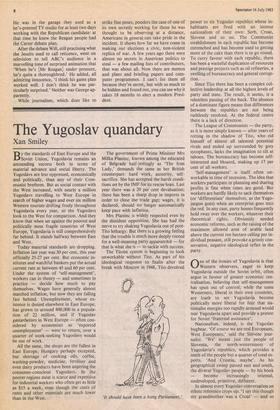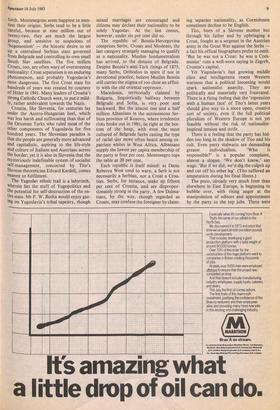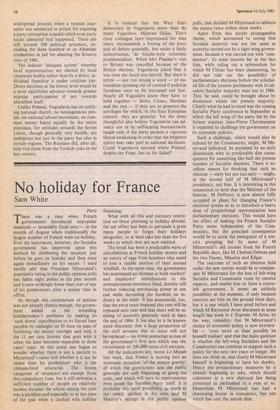The Yugoslav quandary
Xan Smiley
By the standards of East Europe and the Soviet Union, Yugoslavia remains an astounding success bOth in terms of material advance and social liberty. The Yugoslays are less oppressed, economically and politically, than any of their Com- munist brethren. But as social contact with the West increased, with nearly a million Yugoslays travelling to West Europe in search of higher wages and over six million Western tourists drifting freely throughout Yugoslavia every year, so the Yugoslays look to the West for comparison. And they know that when set against the poorest and politically most fragile countries of West Europe, Yugoslavia is still comprehensively far behind. It stands halfway between East and West.
Today material standards are dropping. Inflation last year was 30 per cent, this year officially 25-27 per cent. But economic in- stitutes and watchful bankers put the actual current rate at between 45 and 60 per cent. Under the system of 'self-management', workers can in theory — and sometimes in practice — decide how much to pay themselves. Wages have generally almost matched inflation, but now they are falling fast behind, Unemployment, whose ex- istence is denied elsewhere in East Europe, has grown to around 800,000 in a popula- tion of 22 million, and if Yugoslav gastarbeiters in West Europe — often con- sidered by economists as 'exported unemployment' — were to return, over a quarter of work-seeking Yugoslays would be out of work.
All the same, the shops are the fullest in East Europe, Hungary perhaps excepted, but shortage of cooking oils, cqfee, washing-powder, medicine, fertiliser and even dairy products have been angering the consumer-conscious Yugoslays. In the poorer regions meat is scarce and expensive for industrial workers who often get as little as $15 a week, even though the costs of rents and other essentials are much lower than in the West. The government of Prime Minister Mrs Milka Planinc, known among the educated of Belgrade half-jestingly as 'The Iron Lady,' demands the same as her British counterpart: hard work, austerity, self- sacrifice. She has accepted the harsh condi- tions set by the IMF for its rescue loan. Last year there was a 20 per cent devaluation; there has been a sharp drop in imports in order to close the trade gap; wages, it is declared, should no longer automatically keep pace with inflation.
Mrs Planinc is widely respected even by the dissident opposition. She has had the nerve to try shaking Yugoslavia out of post- Tito lethargy. But there is a growing feeling that the trouble is much more deeply rooted for a well-meaning party apparatehik — for that is what she is — to tackle with success.
The Titoist system is beginning to look unworkable without Tito. As part of his ideological response to Stalin after the break with Moscow in 1948, Tito devolved
it should have been a hung Parliament.'
power to six Yugoslav republics whose in- habitants are fired with an intense nationalism of their own: Serb, Croat, Slovene and so on. The Communist establishment in each republic has become entrenched and has become used to getting more of the cake than there is to go round. To curry favour with each republic, there has been a wasteful duplication of resources and prestige projects such as oil refineries, a swelling of bureaucracy and general corrup- tion.
Since Tito there has been a complex col- lective leadership at all the highest levels of party and state. The result, it seems, is a relentless passing of the buck. The absence of a dominant figure means that differences between the republics are not being ruthlessly resolved, At the federal centre there is a lack of direction.
The League of Communists — the party, as it is more simply known — after years of rotting in the shadow of Tito, who rid himself of almost all talented potential rivals and ended up surrounded by grey sycophants, lacks the imagination to tilt at taboos. The bureaucracy has become self- interested and bloated, making up 17 per cent of all workers.
'Self-management' is itself, often un- workable in time of recession. The idea that workers participate in planning and sharing profits is fine when times are good. But workers are hardly likely to sack themselves (or 'differentiate' themselves, as the Yugo- jargon goes) when an enterprise goes into the red. In any case, party bosses frequently hold sway over the workers, whatever their theoretical rights. Obviously needed economic reforms, such as the raising of the maximum allowed area of arable land above the current ten hectare ceiling per in- dividual peasant, still provoke a grimly con- servative, negative ideological reflex in the party.
One of the ironies of Yugoslavia is that Western observers, eager to keep Yugoslavia outside the Soviet orbit, often argue in favour of greater economic cen- tralisation, believing that self-management has spun out of control; while the same Westerners, liberal in their own countries, are loath to see Yugoslavia become politically more liberal for fear that na- tionalist energies too rapidly aroused would tear Yugoslavia apart and provide a pretext for Soviet 'fraternal assistance'.
Nationalism, indeed, is the Yugoslav bugbear. 'Of course we are real Europeans, West Europeans,' said the Slovene jour- nalist. 'We' meant just the people of Slovenia, the north-westernmost of Yugoslavia's republics, which provides a tenth of the people but a quarter of total ex- ports. 'And Croatia, maybe'. As his geographical sweep passed east and south, the diverse Yugoslav people — by his book — become increasingly oriental, undeveloped, primitive, different.
In almost every Yugoslav conversation an ethnic reference crops up. 'I say this though my grandmother was a Croat' — and so
forth. Montenegrins seem happiest to men- tion their origins. Serbs tend to be a little careful, because at nine million out of twenty-two, they are much the largest group, and sensitive to suspicions of 'hegemonism' — the historic desire to set 1-1P a centralised Serbian state governed from Belgrade and controlling its own small South Slav satellites. The five million Croats, too, are often wary of overstressing nationality: Croat separatism is an enduring Phenomenon, and probably Yugoslavia's most dangerous. The first Croat state for hundreds of years was created by courtesy of Hitler in 1941. Many leaders of Croatia's strong Catholic Church were, to put it mild- ly, rather ambivalent towards the Nazis.
Croatia, like Slovenia, for centuries lay under the Austro-Hungarian heel, which was less harsh and suffocating than that of the Ottoman Turks who ruled most of the Other components of Yugoslavia for five hundred years. The Slovenian paradox is that the people are generally more advanced and capitalistic, aspiring to the life-style and culture of Italians and Austrians across the border; yet it is also in Slovenia that the mysteriously indefinable system of socialist self-management, concocted by Tito's Slovene theoretician Edvard Kardelj, comes nearest to fulfilment.
The Yugoslav ethnic trail is a labyrinth, Wherein lies the stuff of Yugopolitics and the potential for self-destruction of the en- tire state. Mr P. W. Botha would enjoy gaz- ing on Yugoslavia's tribal tapestry, though mixed marriages are encouraged and citizens may declare their nationality to be solely Yugoslay. At the last census, however, under six per cent did so.
The republic of Bosnia-Hercegovina comprises Serbs, Croats and Moslems, the last category strangely managing to qualify as a nationality. Muslim fundamentalism has arrived, to the distaste of Belgrade. Despite Bosnia's anti-Turk risings of 1875, many Serbs, Orthodox in spirit if not in devotional practice, believe Muslim Bosnia still carries the stigma of too close an affini- ty with the old oriental oppressor.
Macedonia, territorially claimed by Bulgaria, linguistically halfway between Belgrade and Sofia, is very poor and backward. But the almost one and a half million Albanians in the autonomous Ser- bian province of Kosovo, where irredentist riots broke out in 1981, lie right at the bot- tom of the heap, with even the most cultured of Belgrade Serbs casting the type of racial sjur more often heard among ex- patriate whites in West Africa. Albanians supply the lowest per capita membership of the party at four per cent. Montenegro tops the table at 20 per cent.
Each republic is itself mixed: as Dame Rebecca West used to warn, a Serb is not necessarily a Serbian, nor a Croat a Croa- tian. Serbs, for instance, make up fifteen per cent of Croatia, and are dispropor- tionately strong in the party. A few Dalma- tians, by the way, though regarded as Croats, may confuse the foreigner by claim-
ing separate nationality, as Cornishmen sometimes decline to be English.
Tito, born of a Slovene mother but through his father and by upbringing a Croat, fought as a sergeant in the Austrian army in the Great War against the Serbs — a fact his offical biographers prefer to omit. 'But he was not a Croat: he was a Com- munist' runs a well-worn saying in Zagreb, Croatia's capital.
Yet Yugoslavia's fast growing middle class and intelligentsia resent Western wariness that a political loosening would spark nationalist anarchy. They are politically and materially very frustrated. There is a rising feeling that the 'repression with a human face' of Tito's latter years should give way to a more open, creative sort of society, even if the full political pluralism of Western Europe is not yet feasible without the risk of nationalist- inspired tension and strife.
There is a feeling that the party has hid- den too long in the shadow of Tito and his cult. Even party stalwarts are demanding greater individualism. 'Who is responsible?' is a popular complaint, almost a slogan. 'We don't know,' say wags. 'But if we did, we'd dig the culprit up and cut off his other leg'. (Tito suffered an amputation during his final illness.) The press, already very much freer than elsewhere in East Europe, is beginning to bubble over, with rising anger at the manipulation of editors and appointment by the party to the top jobs. There were widespread protests when a woman jour- nalist was sentenced to prison for exposing a party corruption scandal which even party hacks admitted had happened. There are still around 500 political prisoners, ex- cluding the three hundred or so Albanian irredentists in jail for abetting the Kosovo riots of 1981.
The indirect 'delegate system' whereby local representatives are elected by local corporate bodies rather than by a direct, in- dividual franchise is under criticism too. Direct elections at the lowest level would be a most significant advance towards greater popular participation if not towards pluralilsm itself.
Unlike Poland, Yugoslavia has no unify- ing national church, no homogeneous peo- ple, no national labour movement, no com- mon enemy hated equally be the entire populace, for attitudes towards the Soviet Union, though generally very hostile, are ambigious not just in the party but also in certain regions. The Russians did, after all, help free them from the Turkish yoke in the last century. It is ironical that the West fears democracy in Yugoslavia more than do many Yugoslays. Milovan Djilas, Tito's close colleague later imprisoned for nine years, recommends a freeing of the press and of debate generally, but under a fairly authoritarian, de Gaulle-style reformist presidentialism. When Mrs Planinc's visit to Britain was cancelled because of the British election, Yugoslavia joked that it was time she faced one herself. But there is terror — not too strong a word — of na- tionalism spinning out of control if political freedoms were to be increased too fast. Nearly all Yugoslays know they have to hold together — Serbs, Croats, Slovenes and the rest — if they are to preserve the privileges for which, in the East European context, they are grateful. Yet the more thoughtful also believe Yugoslavia can ad- vance out ot its suffocating bureaucractic tangle only if' the party permits a vigorous liberal awakening in order that the brightest spirits may take part in national decisions. Could Yugoslavia succeed where Poland, despite the Pope, has so far failed?








































 Previous page
Previous page